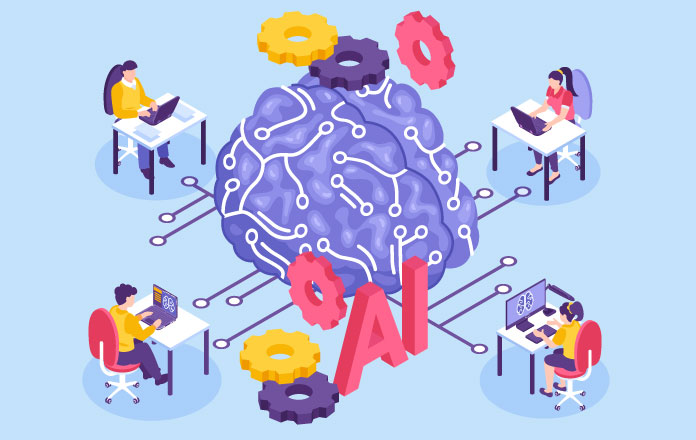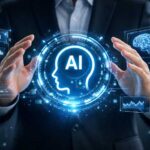In the realm of education, AI is growing and evolving. It is becoming evident that technology has an intriguing opportunity for enhancing student learning levels. Even though AI is still a young technology in education, it has already shown enormous potential in assisting educators and students in achieving their learning objectives. Let’s explore the ten ways AI is revolutionizing the education sector.
Top 10 Applications of AI in Education
Customized Learning:
Customized education for each student was not a part of the traditional educational system. This is where AI in online education may help. AI within the education sector guarantees that each student’s educational software is customized. Additionally, with the help of enabling
technologies like ML in education, the system supports how the learner interprets various teachings and adjusts to that process to lessen the burden. With AI-integrated games, specialized curriculum, and other elements that support efficient learning, this AI and education hybrid focuses on the needs of each individual.
Automating Tasks:
Technology takes up the value-added work with AI in school education and virtual classrooms. AI solutions for education can take notes, check homework, create presentations, arrange research papers, and keep reports by customizing the teaching process. AI improves learning
environments by automating routine tasks, increasing knowledge and efficiency.
Create Smart Content:
The use of AI and ML in education enables educators and subject-matter experts to produce cutting-edge lectures and learning materials. Information visualization, digital lesson generation, and frequent content updates are a few instances of creating AI smart content.
Adaptable Access:
According to a recent poll, more than 60% of education businesses plan to develop education apps using AI/ML supported with contemporary features and tools. The convenience of teaching and learning in different languages is made possible by features like multilingual assistance. AI
is also essential for educating audiences that are blind or deaf. Real-time subtitles are provided for virtual lectures using AI-powered converter tools like Presentation Translator.
Identifying Classroom Vulnerabilities:
Maintaining a good impact on our environmental footprint with remote learning is one of the advantages of AI technology in education. AI and education go hand in hand, enhancing traditional and online teaching. By improving the teaching-learning process for humans, AI merely assists specialists.
Bridging the Skill Gap:
Businesses grappling with the technological gap can benefit from upskilling students. Solutions for software and application development powered by AI and ML provide accessible and cheap alternatives for students to upgrade their skills. In addition, the analysis of skill acquisition by individuals is another way that AI in the education sector affects the L&D (Learning and Development) field. The learning process is automated once the system adjusts how people learn and study.
Personalized Data-Based Feedback:
Effective teaching involves offering ongoing feedback, a crucial distinction between it and merely imparting information. Feedback must come from a reliable source, so AI in education analyses data from everyday sources to determine work reports. A data-based feedback
system aids in understanding where abilities are missing, reduces bias from learning, and improves student happiness. This feedback is customized based on each student’s and employee’s system-recorded performance.
24/7 Support from Conversational AI:
One example of how AI in education uses data to inform and assist is chatbots. Teachers and business people gain from this since it encourages user participation in personalized instruction. Conversational AI in education provides intelligent coaching by carefully studying the pattern of information intake and adjusting to the individual’s needs. AI chatbots may answer questions about registration, provide access to necessary study materials, deliver quick responses, and offer assistance 24/7.
Decentralized & Secure Learning Systems:
The education sector implements AI quickly but gets hampered by problems like data security, flexible data access, antiquated certification procedures, etc. Despite all these difficulties, decentralized AI-based solutions could usher in a positive technological revolution in education.
AI in Examinations:
Exams and interviews can actively use AI software systems to spot suspicious behavior and notify the supervisor. The AI programs monitor each person using webcams, microphones, and web browsers. They also analyze keystrokes, alerting the system to any movement.




